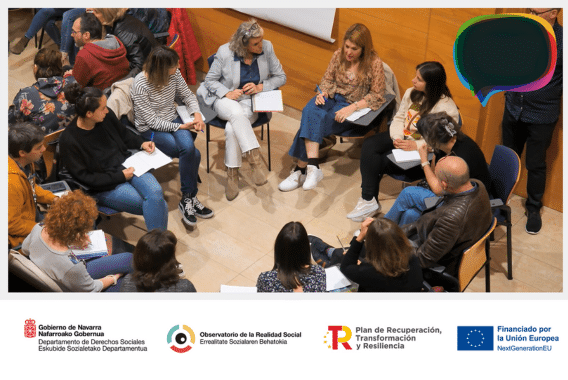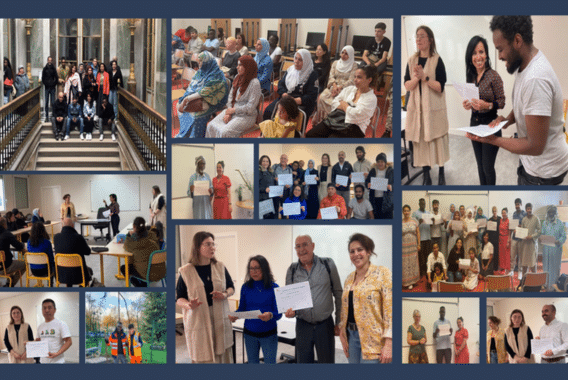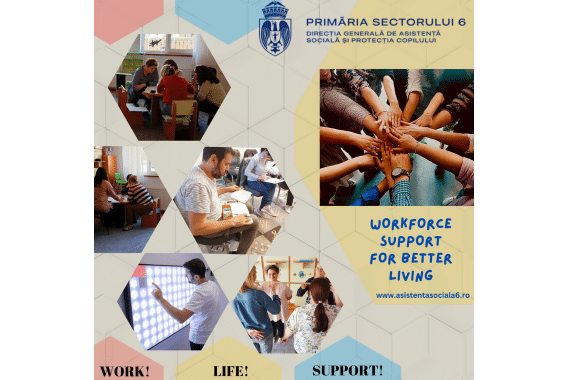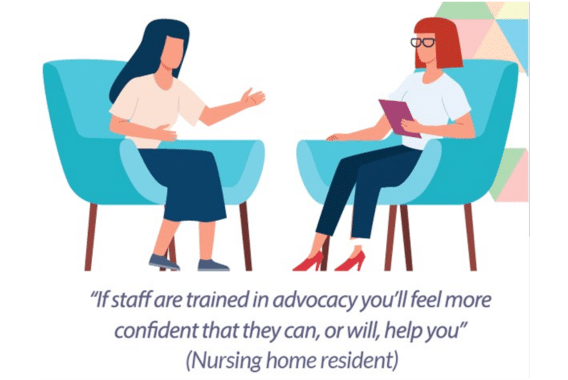Central to the delivery of person-centred care in social services is a well-performing and competent workforce that can understand and address the needs of the people they care for and support. This Award honours social services organisations that have nurtured their workforce to support the provision of person-centred care.
PYCIPEDIA: Knowledge Sharing Platform to Connect Specialist Social Workers
Organisation: Linköping Municipality R&D Centre & IT University of Copenhagen
Country: Sweden
Website 1: https://blogit.itu.dk/codesigngroup/
Website 2: https://www.linkoping.se/language/

In Sweden, many municipalities have only one or two social workers trained in supporting parents with intellectual disabilities in their parenting role using the Parenting Young Children methodology. However, each social worker was working rather independently and there was limited peer support, sharing of best practice, and easy access to specialist training materials. To better support the social workers the wiki-type collaborative platform PYCIPEDIA was developed allowing social workers across Sweden to connect, and to create, browse, edit, and share training materials with each other and directly with parents. The platform has almost 100 registered social workers from 26 municipalities who engage in content development and online sharing. They have provided positive feedback on how they use the materials created and uploaded by other social workers, and how they are learning and being inspired by each other.
Developing a Communication and Person-Centred Practice
Organisation: Northern Health and Social Care Trust
Country: United Kingdom
Website: https://www.northerntrust.hscni.net/

This project supports health and social care staff working with persons who have difficulty with or cannot verbally communicate. The provision of adequate training in the use of Talking Mats and Makaton, a unique language programme that uses symbols, signs and speech, was key to removing the barriers in communication that affect the social worker’s ability to properly support the people with whom they work. By further skilling their staff in new methods of communication, they were able to better engage, build rapport and working relationships with supported persons, ensuring person-centred practice and outcomes. The use of Talking Mats helps to focus conversations and redress power imbalance, providing a framework for shared and supported decision making.
Dialogical Approach to Care
Organisation: Regional Government of Navarra – Department for Social Rights
Country: Spain
Moving to an integrated care model, which recognises the person as the main actor in their care journey can only be achieved through an accompanying change in professional practice. In the new care model, professionals have an accompanying, guiding and motivating role, rather than just an expert one. Through this project, the Government of Navarra will provide child protection professionals with the training and tools necessary to adapt to this change. The course will train 200 professionals in the Dialogical Approach, which promotes participation and dialogue as a means for people to activate their own resources, and actively collaborate with different professionals who provide support.

Learning French to Get a Job
Organisation: ActivitY’
Country: France
Website: https://www.agence-activity.fr/

In France, the primary barrier of employment for asylum seekers is an underestimation of their French language skills and professional experience. This project addresses the issue by offering an alternative training programme, ‘Learning French to Get a Job’. Based on an evaluation of their oral and written French, learners receive a refresher training, as well as personalised and job-oriented training of 108 hours concentrated over 6 weeks (82% of trainees have reached at least the higher level of the Common European Framework of Reference). Finally, learners have access to intensive and professional support for their job search. It was found that 90% of participants registered in the programme transitioned towards employment.
Process Supervision: Professional and Personal Support
Organisation: Bucharest 6th District General Directorate for Social Care and Child Protection
Country: Romania
Website: https://www.protectiacopilului6.ro/
This project aims to provide support to social workers and relatives of persons with disabilities who have difficulty letting go of built-up stress and emotions accumulated from a demanding environment. Through the programme, professional supervision has been replaced by process supervision, whereby specialist professionals supervise both the personal and professional difficulties experienced by employees in individual and group scenarios. Support groups bring together the beneficiary, social worker, the relatives of the beneficiary and a supervisor. The supervisor provides guidance to create the space and the conditions for decentralisation and emotional detachment from unconstructive emotions, which has positive effects both for the employee and the supporter, as well as the beneficiary. Since the introduction of process supervision, decreased staff turnover has been measured, relatives are better informed and supported, and the beneficiaries have greater autonomy.

The Fundamentals of Advocacy in Health and Social Care
Organisation: Health Information and Quality Authority (HIQA)
Country: Ireland
Website: https://www.hiqa.ie/
A review carried out by an Expert Panel on Nursing Homes in the aftermath of the Covid-19 pandemic in Ireland, identified the lack of advocacy services available to nursing home residents as a significant issue. Through this project, HIQA developed a free online learning course, ‘The Fundamentals of Advocacy in Health and Social Care,’ to support frontline staff, service users and the general public to better understand the importance of advocacy, how to support people to advocate for themselves, the boundaries of the role of advocates, and how and when to raise awareness of independent advocacy services. The online learning course has over 10,200 completions to date and has received positive feedback from learners.

Training and Employment for Individuals with Physical Disabilities
Organisation: Na Laga’at Centre
Country: Israel
Website: https://nalagaat.org.il/en/

Significant accessibility barriers pose challenges for individuals who are deaf or blind, often demanding specialised measures and substantial resources. The project is dedicated to meeting the specific needs of this diverse group of individuals with physical disabilities, fostering inclusion and engagement within the cultural sphere. Person-centred care is prioritised through close collaboration with the internal Human Resources department. The initiatives encompass safeguarding employee rights, delivering support services like home visits, and facilitating the acquisition or repair of devices. The Centre underwent evaluation by Midot, an independent social investment evaluator, and was awarded the Midot Seal of Effectiveness, which is valid until 2026, a recognition of the unwavering dedication to enhancing accessibility and empowerment for individuals with physical disabilities.
Health Care Academy
Organisation: City of Mölndal
Country: Sweden

With a backdrop of a growing elderly population, large-scale retirements, and recruitment challenges in the City of Mölndal, this project aims to address the supply of skills in the health and social care administration, targeting both staff and managers. The Health Care Academy serves as a digital platform where employees can access a wide range of information, courses, and trainings on various topics related to the care profession.
The project promotes person-centred care by offering a comprehensive digital induction to workers, enhancing their knowledge in all aspects of the care profession. This, in turn, increases staff and manager confidence and enables better-individualised care for beneficiaries. More than 1,500 courses and training sessions have been completed as of June 2023. Results indicate there is an increased knowledge among staff and managers and improved conditions for delivering quality care to users. The implementation of digital induction ensures consistent information delivery to all staff and managers, regardless of time or location, simplifies document signing, and reduces administrative workload for managers.
